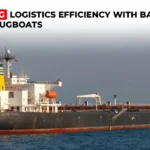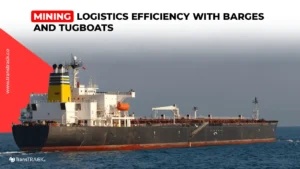Here’s How Container Yards Play an Important Role in Logistics!
Posted on December 21, 2023 by Nur Wachda Mihmidati

Container yards, or commonly referred to as “container yards,” are important facilities in the logistics industry. In a world that is constantly evolving and changing, container yards play a crucial role in ensuring the smooth running of complex supply chains. Without a container yard, logistics activities will be disrupted and can affect the quality of service and reputation of the company.
The container yard itself has several functions and also types. To be able to understand it clearly, you can read the full description in the following article TransTRACK.
What is a Container Yard?
Before we dig deeper into the role and types of container yards, it helps to understand what a container yard is. A container yard is an area specifically designed to store, manage, and coordinate containers used in the transportation of goods. These containers can contain a wide range of goods, from consumer goods to industrial cargo.
Container yards are often located at ports or related logistics facilities, such as large distribution centers. It serves as a transitional place for containers that are in transit. Upon arrival from the ship, the container will be unloaded and stored in this yard before being further transported using trucks or trains.
Function of Container Yard
Container yards play an important role in maintaining the smooth flow of goods from the ship to the final destination. To understand its important role, let’s explore in more detail the functions of a container yard in the world of logistics.
Storage Area
One of the main functions of a container yard is as a temporary storage area for containers arriving from ships. When the ship arrives at the port, the containers are unloaded and placed in this yard. This helps avoid congestion at the port and allows time for further logistics processes, such as inspection and inventory management.
Logistics Coordination
Container yards are often connected with other modes of transportation, such as trucks and trains. They facilitate the transfer of containers between ships, trucks, and trains. This allows containers to move smoothly from one mode of transportation to another, which is an important aspect in a complex supply chain.
Inspection and Repair
Furthermore, a container yard can also serve as a place where containers are inspected, repaired, or maintained. The inspection is done to ensure that the container is in good condition and safe for shipment. If any damage or problems are found, repairs can be made at these yards before the container is sent back into service.
Security
Finally, a container yard can be used to keep shipping containers and cargo safe. Container yards are usually equipped with sophisticated security systems, including video monitoring, restricted access, and strict access control to protect containers from theft or unauthorized manipulation.
Types of Container Yard
There are several types of container yards with different roles and scopes. Here are some common types of container yards:
Container Yard at the Port
Container yards at ports are the most common type. This type is located at the port and serves as the first place where containers arrive after being unloaded from a ship. Its main function is to store the arriving containers ready to be picked up by the next carrier, such as a truck or train. These yards usually have a robust infrastructure, including cranes and heavy equipment to move containers efficiently.
Container Yard at Distribution Center
Some large companies have their own distribution centers equipped with container yards. They use these yards to manage their inventory and product distribution. Yards in distribution centers often act as internal logistics hubs of companies and ensure efficient flow of goods to various final destinations.
Intermodal Container Yard
Intermodal container yards are connected to different transportation networks, such as trains and trucks. They serve as an exchange point between different modes of transportation. This allows containers to be transferred from ships to trains or trucks and vice versa efficiently. These yards play an important role in facilitating cross-modal transportation.
Dry and Reefer Container Yard
There are two main types of containers that can be stored in yards, namely dry containers and reefer containers. Container yards designed for refrigerated containers are equipped with facilities that make it possible to maintain the temperature inside the container at an appropriate level.
In the face of increasing market demands, container yards must constantly evolve and adapt to meet customer needs. This includes integrating advanced technologies, such as the Truck Appointment System (TAS) to avoid costly delays and keep the flow of goods moving.
An efficient and well-organized container yard is the foundation for achieving logistics success. With the help of advanced technology such as Truck Appointment System, logistics companies can maximize their operational efficiency, ensure timely container handling, and provide better service to their customers.
In the face of a challenging logistics future, container yards will continue to be a critical component in maintaining the seamless and efficient flow of goods. By continuing to understand and utilize the important role container yards play in the world of logistics, companies can remain competitive in a dynamic global market. Interested in learning more about logistics solutions that can help improve container yard efficiency? You can visit TransTRACK for more information. TAS can be a solution in improving logistics operations and maintaining an efficient supply chain.
Recent Post
Managing an Integrated Cold Chain to Minimize Risk and Loss
February 20, 2026Mining Logistics Efficiency with Barges and Tugboats
February 18, 2026Topic :
Recommended Articles

 Bahasa Indonesia
Bahasa Indonesia








